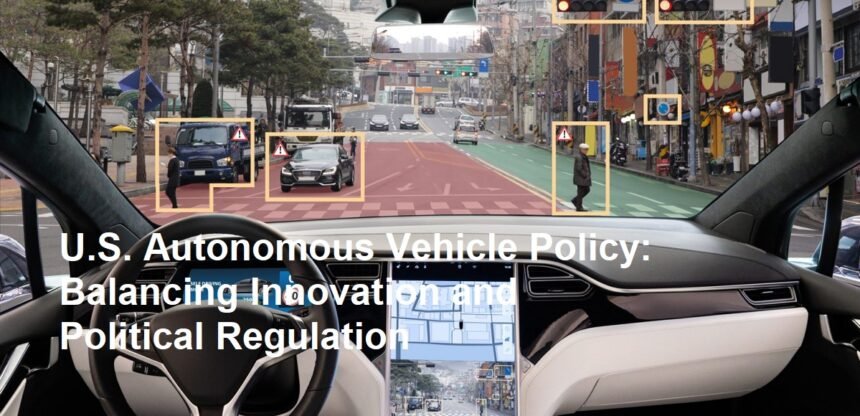Introduction: The Road Ahead for Self-Driving Cars
When people hear “self-driving car,” they imagine futuristic highways filled with vehicles that operate without human hands. In reality, the U.S. autonomous vehicle policy is still in flux, caught between innovation and political debates. While automakers and tech giants push forward, regulators are cautious about safety, liability, and ethics.
Understanding this balance of regulation in vehicle technology, the promise of self-driving cars, and the tug-of-war in political innovation is key for anyone interested in the future of mobility.
The Current State of U.S. Autonomous Vehicle Policy
Federal vs. State Responsibilities
Unlike some countries with centralized frameworks, the U.S. follows a fragmented approach:
- Federal government handles vehicle safety standards.
- States regulate licensing, insurance, and liability.
This overlap often causes confusion for companies and slows nationwide rollouts.
Key Federal Agencies Involved
- NHTSA (National Highway Traffic Safety Administration): Oversees vehicle safety standards.
- DOT (Department of Transportation): Creates guidelines for AV testing.
- FTC (Federal Trade Commission): Monitors consumer protection and data privacy.
Innovation Meets Regulation
Why Regulation Is Necessary
Regulating vehicle technology isn’t just red tape—it’s about preventing accidents, protecting data, and ensuring accountability when things go wrong.
The Risk of Overregulation
However, too much regulation risks slowing down innovation. Many automakers argue that restrictive rules may push AV development overseas, where regulations are more flexible.
Practical Tip for Businesses
If you’re a startup in the AV space:
- Track both federal and state rules. Expansion often depends on state-by-state approval.
- Partner with local governments. Pilot programs gain trust and visibility.
Self-Driving Cars: Opportunities and Challenges
The Potential Benefits
- Safety: Reduce human error, which causes most road accidents.
- Accessibility: Help seniors and people with disabilities.
- Efficiency: Cut traffic jams and emissions.
The Challenges
- Technical limitations: Full Level 5 autonomy is still years away.
- Public trust: Surveys show many Americans remain skeptical.
- Ethical dilemmas: How should cars react in life-or-death scenarios?
Practical Tip for Consumers
If you’re curious about self-driving cars:
- Start with semi-autonomous features. Many cars already offer adaptive cruise control and lane assist.
- Stay informed about recalls and updates. Software patches are critical for AV safety.
Political Innovation: Who’s Driving the Debate?
The Role of Lawmakers
Congress has introduced bills like the SELF DRIVE Act, but progress stalls due to debates over liability, safety, and cybersecurity.
The Corporate Influence
Companies like Tesla, Waymo, and Cruise are actively lobbying for clearer, friendlier regulations. This is where political innovation comes into play—balancing corporate ambition with public interest.
Practical Tip for Policymakers
- Encourage innovation sandboxes. Safe testing zones can accelerate progress.
- Balance safety and flexibility. Overly strict rules may hinder growth, but too little oversight risks public backlash.
U.S. vs. Global Approaches
Europe’s Model
The EU emphasizes strict safety and privacy rules. Companies must comply with uniform standards across member states.
China’s Model
China offers aggressive government support, funding, and designated AV testing zones.
What the U.S. Can Learn
A middle ground may be best—encouraging competition like China while ensuring consumer protection like the EU.
Practical Tip for Investors
If you’re investing in AV tech:
- Diversify geographically. Don’t just rely on the U.S. market.
- Follow regulatory trends. Global leaders often dictate where capital flows next.
The Future of U.S. Autonomous Vehicle Policy
Short-Term Outlook
Expect continued patchwork regulation, with certain states like California, Arizona, and Texas leading AV testing.
Long-Term Vision
The federal government will likely establish a national framework, but only after public trust improves and safety is proven at scale.
Practical Tip for Everyday Drivers
- Stay flexible. Leasing cars may be smarter than buying if AV technology disrupts ownership models.
- Keep an eye on insurance policies. Liability rules may change how premiums work for semi- or fully autonomous cars.
Who Wins and Who Loses?
Winners
- Tech companies and automakers pushing the innovation frontier.
- Cities that embrace pilot programs and smart infrastructure.
- Consumers who gain safer, more efficient travel in the long run.
Losers
- Traditional industries tied to human-driven cars, like driving schools.
- Insurance companies facing redefined liability structures.
- Regions slow to adopt AVs, risking economic lag.
Conclusion: The Balancing Act Ahead
The U.S. autonomous vehicle policy isn’t just about laws—it’s about shaping the future of transportation. From vehicle technology regulations to the promise of self-driving cars and the influence of political innovation, the road ahead is full of both opportunities and speed bumps.
What’s your take—should the U.S. move faster in approving self-driving cars, or should safety and regulation come first? Drop your thoughts in the comments below!












